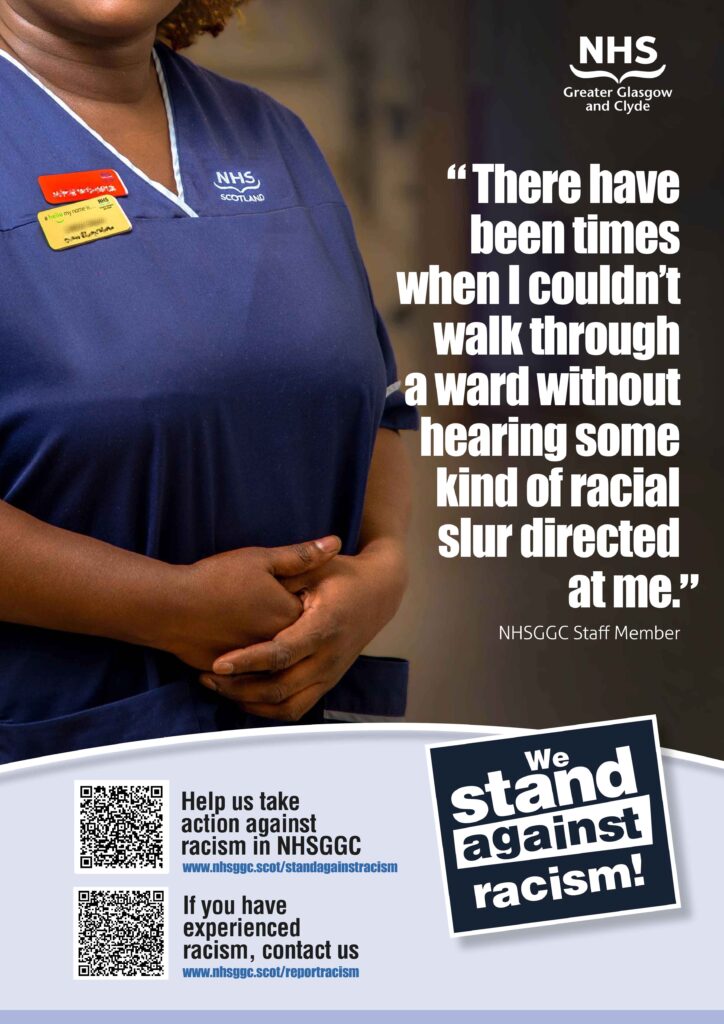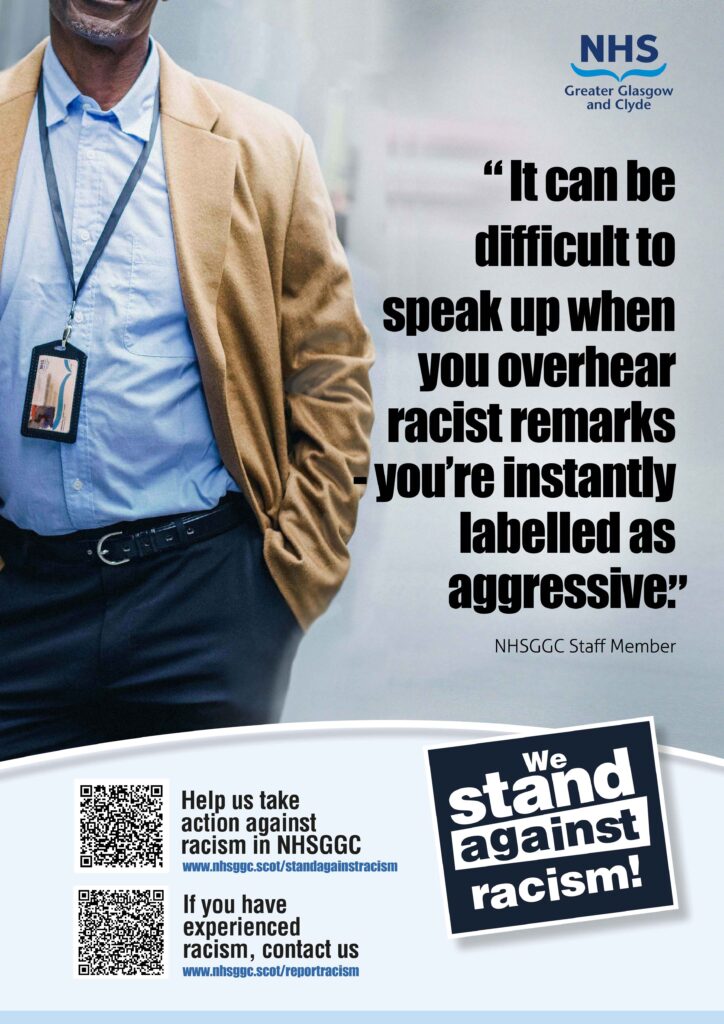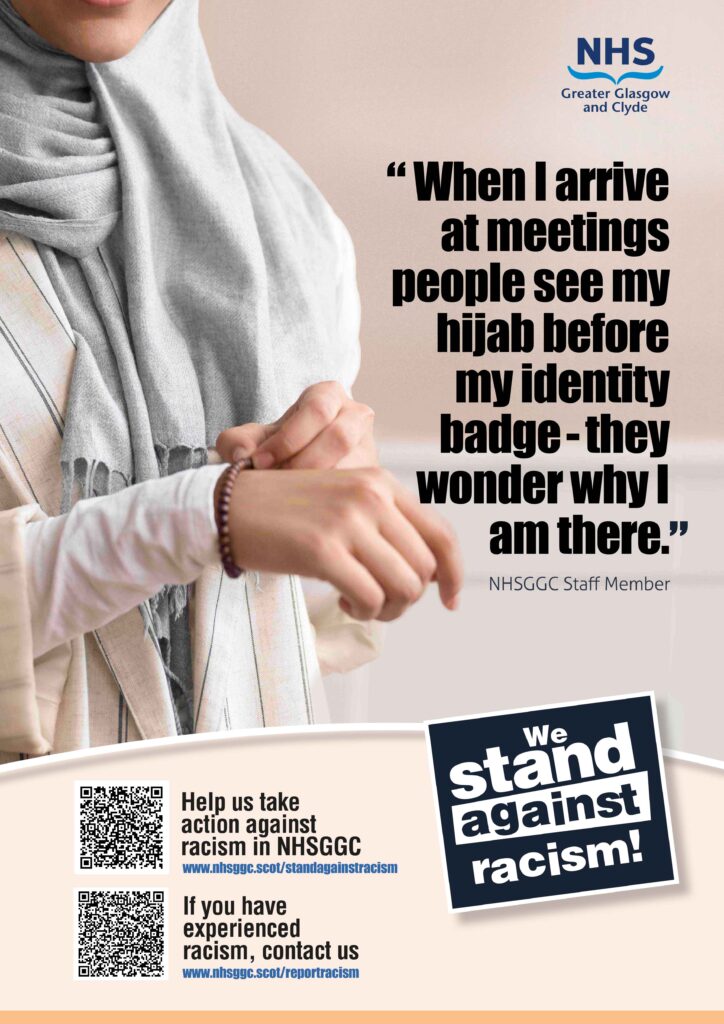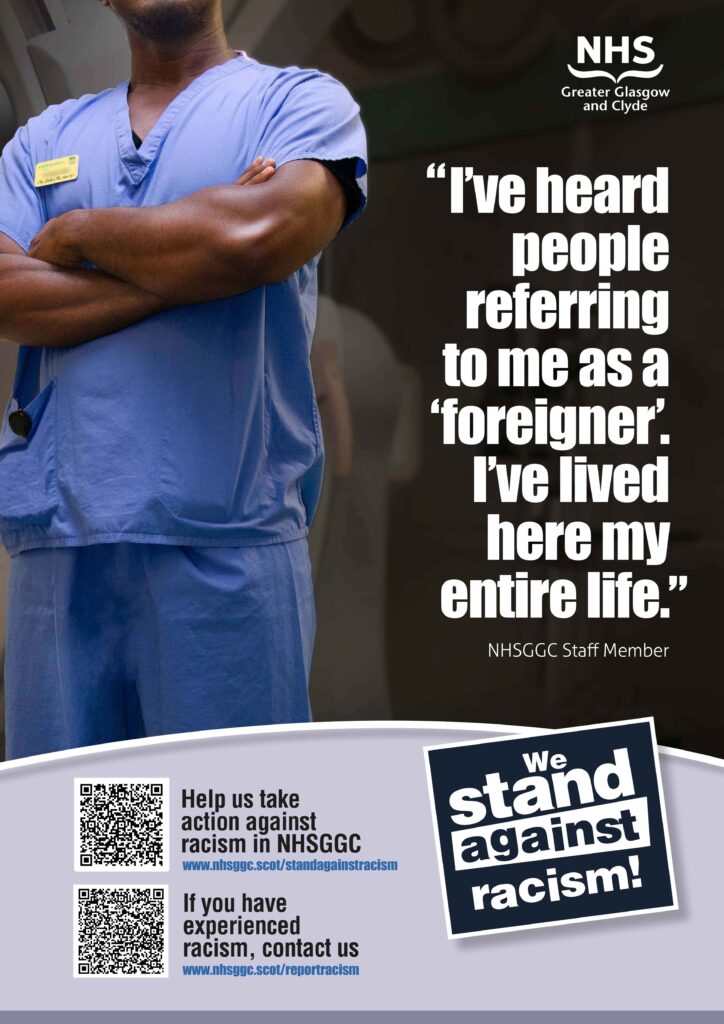All staff in NHSGGC should feel safe, respected and valued.
Our workplace should be a place where discrimination is unacceptable and where everyone has the chance to thrive, regardless of their background or identity.
Our anti-racism campaign is based on the words of our own staff from their experiences at work. NHSGGC is an inclusive employer and there is no place for racism in our services.
Racism takes many forms, from stereotyping to blatant harassment, physical harm and direct discrimination.
‘Everyday racism’, such as thoughtless, demeaning or offensive comments, can be subtle and difficult to challenge. For example, constantly being asked “Where are you from?” when generations of the family have been born in Scotland. Or hearing a mimicked accent in workplace banter.
It’s up to all of us to stand against racism. Here are some ways we can make a difference.
Speak Up!
If you witness racism, don’t stay silent – challenge it.
If you’re able to – and feel it’s appropriate and safe to, speak up in the moment and address the colleague or patient that is demonstrating racist behaviour.
If the moment has passed, you can still speak up. Don’t let casual racist comments or asides go by. Focus on how it’s made you feel rather than labelling the behaviour – this increases the likelihood that the person will listen and learn. For example – “I felt really uncomfortable when I heard the comment you made during that meeting. What did you mean by that?”
If racism is directed at your colleague by a patient, offer support to your colleague.
If you don’t feel you can intervene in the moment, record the incident by writing it down as soon as possible. Follow it up later by checking in with the colleague the behaviour was directed at to see if they’re ok and if they would appreciate support.
It’s really important to report any incidents. Speak to a senior member of staff or contact the HR Helpline directly. See Report It section below.
Get confident about speaking up! Attend our Active Bystander Training and learn how to effectively intervene in situations of racism and discrimination.
Support Colleagues
It’s not enough to simply not be racist. NHSGGC staff must be actively anti-racist. This means being an ally to those who experience racism by listening, acting and working together to address injustices.
Educate Yourself
Increase your confidence in taking action by getting to know the issues.
Racial Injustice across Scotland
The Coalition for Racial Equality & Rights (CRER)
Race Discrimination at Work – the law
Race Discrimination at Work – Professional Standards
Racism in the workplace – General Medical Council
Delivering racial equality in medicine – British Medical Association
Acknowledge & Respect All
- Listen to the experience of black and minority ethnic people
- Understand the sensitivities of language and get people’s names right
- Find the similarities and the things we have in common; respect the differences
- Make space for those who are often not heard
- Confront your own biases and stereotypes
Be an Active Bystander
If you witness racism of any kind it is your responsibility as an NHSGGC staff member to take action.
Commit to taking positive action when witnessing unacceptable behaviour.
Gain confidence on how to intervene by attending Bystander Training and ensure any incidents are reported.
Listen to and Support Colleagues Directly Affected by Racism
When someone shares their experience of racism –
- Listen – Remember that this moment is not about you and your feelings.
- Don’t compare – Making comparisons to your own experiences can feel invalidating to the person who is sharing.
- Don’t dismiss – A response like, ‘I’m sure they didn’t mean it’ can feel to the person sharing like you’re minimising or brushing off their experience.
- Acknowledge – Statements like, ‘I’m sorry you experienced that’ or, ‘No one should have to go through that’ help the person sharing feel heard and validated.
- Support – It can mean a lot for someone to hear a simple statement like, ‘I’m here for you.’
Adapted from Amnesty International
Raise Awareness of the Issues
Listen to people with lived experience of racism and amplify their voices.
Share your actions with colleagues, friends and family and encourage them to join you.
Report It
Anyone can and should report a racist incident.
If you believe you or one of your colleagues has experienced racism, call our HR Helpline on 0141 201 8545. Mon – Fri 9am to 4pm (Thurs 12pm to 4pm)
Any member of staff who experiences racism from a patient in their professional role or witnesses it, should report it to their line managers and document it on Datix.
Where a perceived criminal offence has taken place Police Scotland should be contacted and the incident number included in the Datix report. If it’s not an emergency (if there is no immediate risk to the wellbeing of the individual) you can call 101 and make a verbal report to the police. Call 999 in an emergency situation.
Get Involved
Make sure your team makes a statement by displaying your own, personalised Stand Against Racism poster
Speak to your colleagues and manager and get agreement to sign up your ward / service.
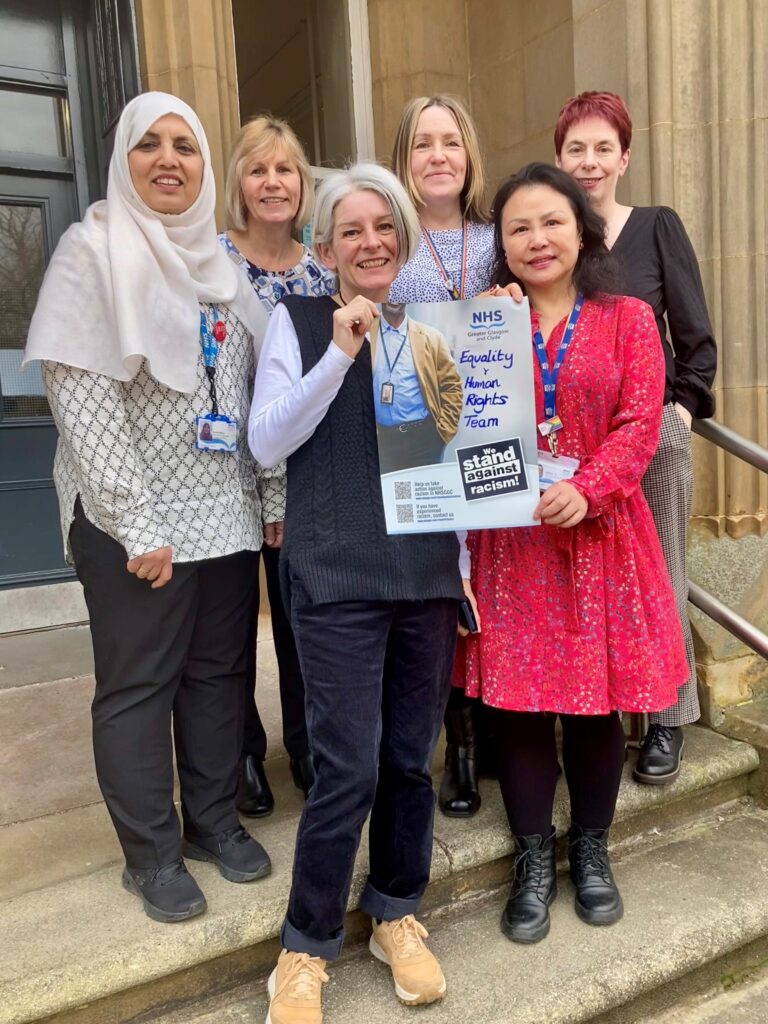
Contact us at ggc.standagainstracism@ggc.scot.nhs.uk for a copy of your personalised poster, write your team name in the space provided and display it where everyone can see.
Please also send us a photo for our ‘See Who Has Signed Up’ gallery!
Join the BME Staff Network
Join the BME Staff Network to connect with colleagues, share experiences and support each other. You can join as a BME member of staff or as an ally.
Follow and Support Anti-Racism Activities
- Ask the Equality and Human Rights Team at equality@ggc.scot.nhs.uk for guidelines on how to ensure your ward or service doesn’t discriminate against BME patients.
- Keep informed through social media campaigns and commentators.
- Support drives for change and demand action by signing up to campaigns and petitions.
